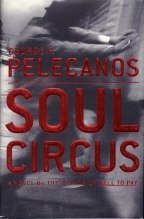Soul Circus
George P. Pelecanos
Little Brown / Time Warner
US Hardcover First
ISBN 0-316-60843-2
Publication Date: 03-15-2003
343 Pages; $24.95
Date Reviewed: 03-16-04
Reviewed by: Rick Kleffel © 2004

REFERENCES
COLUMNS
|
|
|
Soul CircusGeorge P. PelecanosLittle Brown / Time WarnerUS Hardcover FirstISBN 0-316-60843-2Publication Date: 03-15-2003343 Pages; $24.95Date Reviewed: 03-16-04Reviewed by: Rick Kleffel © 2004 |
|
|
REFERENCES |
COLUMNS |
Following characters across a series of novels is a pleasure for the writer as well as the readers. Characters created by the writer grow in unexpected ways. If a character is created and maintained with enough integrity, the growth they undergo as an organic, unplanned creative act can easily seem to be the result of careful artistic planning. In a sense that growth is the result of careful artistic planning; but it's a result that cannot be accurately foreseen. It's all down to the integrity of the characters. If the characters have come to life off the page for the writer, they likely will for the reader.
When George Pelecanos brought together Derek Strange and Terry Quinn in 'Right as Rain', he was operating on instinct. It served him well in the sequel, 'Hell to Pay', when the growth of the characters became a plot element of that powerful novel. In 'Soul Circus', he continues the arc of these fascinating, flawed characters, following them through the mean streets of our nation's capital. Back as well is Granville Oliver, the ghetto boy who remade himself into a powerful criminal only to be turned in by one of his lieutenants. The catalyst that brings the three of these men to turning points in their lives is Mario Durham, a sorry-looking young man who pays Strange and Quinn to locate his girlfriend. The money they're paid might as well be 30 silver coins.
'Soul Circus' follows the format of the other Strange/Quinn mysteries. Readers meet some bad actors, some good actors, and watch, helplessly entranced as events play out in streets ruled by an economy that takes no prisoners. What makes Pelecanos' novels so superior is a combination of stripped-down prose and the depth of characterization that he brings to all sides of all characters. His protagonists, Derek Strange and Terry Quinn, are not unadulterated good guys. Strange has a problem staying faithful to the woman he loves -- who loves him. That he manages to do so in this novel in a small triumph. But Strange is not above taking bad money from bad people, nor is he above breaking the law if it serves his purpose. These acts do come back to haunt him, however. Quinn has a problem with anger, a barely buried self-loathing that takes him into dangerous situations that he then makes even more dangerous.
Similarly, Pelecanos creates some of the most frightening killers to pull triggers that you're likely to read about outside of the newspaper. But what makes these men particularly frightening are the glimpses of goodness and tenderness that go into the mix. Nobody's all good or all bad. While we have a constant tension between blacks and whites, everybody's morals are gray. Particularly affecting in this novel is Ulysses T. Foreman, an ex-cop who has become an illegal gun dealer. He is ruthless and noble, endearingly in love with his sleazy girlfriend and viciously impartial in his insistence on being able to sell guns to both sides of an urban drug-turf battle. It's the kind of characterization that gets a best-supporting actor nomination in the movies.
Though much of this novel will feel happily familiar to his readers, don't think for a moment that Pelecanos is going to tread the same territory that he has in the previous entries. He's on a roll with Derek Strange and Terry Quinn. There are moments of forgiving sweetness that will charm and moments of heartless violence that will chill. In the end, it's the moments of redemption, the glimpses of light in the dark that stay with the readers and bring them back for more. But Pelecanos can seem as heartless as his most dead-eyed killers. The light he creates is surely set off against a dark background, and one does not exist without the other. But it's not that Pelecanos is heartless, really; rather, he observes with an eye so keen, a vision so sharp that it cuts deep, straight to the heart. The pain will be redeemed; but it will hurt. It will hurt a lot.